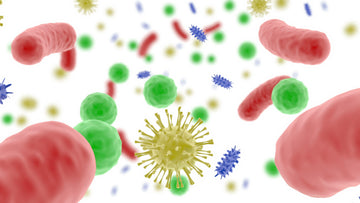Over recent years, the importance of the gut microbiome in humans has gained significant attention, linking it to a myriad of health benefits, from digestive well-being to mental health. Similarly, research into the gut microbiome in dogs has expanded, revealing fascinating insights into how these microorganisms influence a dog’s overall health. The gut microbiome—comprising trillions of bacteria, fungi, and other microorganisms—plays a crucial role in digestion, immunity, and even behavior. Understanding this complex system can help improve the quality of life for our canine companions and may offer solutions for common health issues.
What is the Gut Microbiome?
The gut microbiome refers to the collection of microorganisms residing in the gastrointestinal (GI) tract. In dogs, as in humans, these microorganisms exist in a delicate balance, where beneficial bacteria outcompete harmful pathogens to maintain digestive health. The microbiome begins to establish itself shortly after birth and evolves over time, influenced by factors such as diet, environment, age, and genetics.
The balance within the gut microbiome is vital; any disruption, often referred to as dysbiosis, can lead to gastrointestinal issues such as diarrhea, constipation, and more severe conditions like inflammatory bowel disease (IBD). The balance between the "good" and "bad" bacteria can also influence other areas of health, such as the immune system, metabolism, and even brain function.
The Role of the Gut Microbiome in Canine Health
1. Digestion and Nutrient Absorption
The gut microbiome plays a crucial role in breaking down food, particularly fiber, which the dog’s own digestive enzymes cannot digest. Beneficial bacteria in the gut ferment this fiber into short-chain fatty acids, which are essential for maintaining colon health. A healthy gut microbiome also aids in the absorption of vitamins and minerals, ensuring that dogs receive the necessary nutrients from their food .
2. Immune System Regulation
Approximately 70% of a dog’s immune system resides in the gut. The microbiome acts as a barrier to harmful pathogens, preventing them from entering the bloodstream. Moreover, the gut microbiome influences the development of immune cells, helping the body recognize and attack harmful invaders . A well-balanced microbiome contributes to a strong immune response, whereas an imbalanced one can lead to a weakened immune system, making the dog more susceptible to infections and illnesses.
3. Mental Health and Behaviour
The gut-brain axis is a bidirectional communication pathway between the gastrointestinal system and the brain, and it is not unique to humans. In dogs, this connection has been shown to influence behavior and mood. For example, research suggests that a healthy gut microbiome may reduce anxiety and stress in dogs, while dysbiosis may contribute to behavioral issues such as aggression or hyperactivity. This connection is mediated by neurotransmitters such as serotonin, a significant proportion of which is produced in the gut .
4. Obesity and Metabolism
Obesity is a common issue in dogs, and the gut microbiome plays a role in regulating body weight. Certain microbial populations in the gut are associated with obesity, as they may extract more energy from food and influence fat storage . By modulating the gut microbiome through diet or probiotics, it may be possible to help manage obesity in dogs, contributing to healthier weight and overall wellness.
5. Chronic Diseases
Research is increasingly linking an imbalanced gut microbiome to chronic diseases in dogs, such as diabetes, allergies, and autoimmune conditions. For example, dogs with inflammatory bowel disease often exhibit significant changes in their gut microbiome composition, including reduced microbial diversity . By restoring balance in the microbiome, either through diet changes, probiotics, or fecal transplants, it may be possible to alleviate the symptoms of these chronic conditions and improve the quality of life for affected dogs .
The Influence of Diet on the Gut Microbiome
Diet is one of the most critical factors in shaping the gut microbiome. Commercial dog foods, particularly those with high levels of processed ingredients and low fiber, can negatively impact the diversity and balance of the gut microbiome. On the other hand, diets rich in whole foods, fiber, and prebiotics (such as certain fruits and vegetables) support a healthy microbiome. High-quality dog food that includes a balance of protein, fiber, and fats can help maintain a thriving microbial community in the gut .
Probiotics and prebiotics are also commonly used to support gut health. Probiotics are live beneficial bacteria that can be added to the diet to help replenish the gut microbiome. Prebiotics, on the other hand, are non-digestible fibers that serve as food for the beneficial bacteria. Together, they work to restore balance in the gut, particularly after disruptions such as antibiotic use or gastrointestinal illness.
Emerging Treatments and Research
The role of the gut microbiome in dog health is an area of active research, and new treatments are emerging based on our growing understanding of this complex ecosystem. Fecal microbiota transplantation (FMT), which involves transferring stool from a healthy donor dog to a recipient with a disrupted microbiome, has shown promise in treating conditions like chronic diarrhea and inflammatory bowel disease .
Additionally, ongoing studies are exploring how specific strains of bacteria can be used to target particular health issues, from improving digestion to boosting immunity and reducing anxiety. The future of canine healthcare may involve more personalized approaches that consider a dog’s unique microbiome composition.
Conclusion
The gut microbiome is a vital component of a dog’s overall health, influencing everything from digestion to immune function, mental health, and chronic disease management. As research continues to unveil the complexities of the canine microbiome, it is becoming increasingly clear that maintaining a healthy gut is crucial for preventing illness and promoting longevity in dogs. Pet owners can support their dog’s gut health through a balanced diet, the use of probiotics and prebiotics, and by working with veterinarians to address any signs of gastrointestinal imbalance.
Understanding and nurturing the gut microbiome is not just about treating diseases; it’s about fostering a foundation of health that can enhance the well-being of dogs throughout their lives.
References
- Suchodolski, J. S. (2016). "The Microbiota of the Canine and Feline Gut." Veterinary Clinics of North America: Small Animal Practice, 46(5), 1121-1132. https://doi.org/10.1016/j.cvsm.2016.06.003
- Bermingham, E. N., Young, W., Kittelmann, S., et al. (2017). "Diet and the Microbiota of Dogs and Cats." Annual Review of Animal Biosciences, 5, 241-264. https://doi.org/10.1146/annurev-animal-022516-022914
- Minamoto, Y., Hooda, S., Swanson, K. S., & Suchodolski, J. S. (2012). "Fecal Microbiota Transplantation: A Therapeutic Option for Gastrointestinal Disease in Dogs?" Journal of Veterinary Internal Medicine, 26(3), 785-787. https://doi.org/10.1111/j.1939-1676.2012.00939.x
- Schmitz, S. & Suchodolski, J. S. (2016). "Understanding the Canine Intestinal Microbiota and Its Modification by Probiotics and Prebiotics." Veterinary Medicine and Science, 2(2), 71-94. https://doi.org/10.1002/vms3.17
- Ziese, A.-L., & Suchodolski, J. S. (2021). "Impact of Diet on the Gut Microbiome of Dogs and Cats." Animal Frontiers, 11(2), 37-47. https://doi.org/10.1093/af/vfab008
- Handl, S., German, A. J., Holden, S. L., et al. (2013). "Changes in the Fecal Microbiota of Dogs Associated with Weight Loss." Proceedings of the National Academy of Sciences, 110(38), 16178-16183. https://doi.org/10.1073/pnas.1306574110
- Pilla, R., & Suchodolski, J. S. (2020). "The Gut Microbiome of Dogs and Cats, and the Influence of Diet." Veterinary Clinics of North America: Small Animal Practice, 50(1), 21-41. https://doi.org/10.1016/j.cvsm.2019.09.006
- Blake, A. B., & Suchodolski, J. S. (2022). "Canine Gut Microbiome: Emerging Literature and Knowledge." Veterinary Clinics: Small Animal Practice, 52(1), 51-69. https://doi.org/10.1016/j.cvsm.2021.09.004



